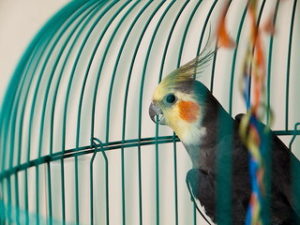When a Breeder tells you that the animal is aggressive, tends to bite, doesn’t get along with other animals or children, think twice before bringing it home.
Hello, my name is Fabian Marquez. I am a lover of all animals, but my favorites are dogs and birds. Several years ago I bred Chihuahuas; they have so much personality for such a small package! I still own four of them; I believe I will always have one or two of these sassy dogs by my side.
About 10 years ago I started breeding birds. I was so fascinated with these enchanting creatures that I began to obtain more breeding pairs, thus having more bird babies to feed and care for.

Have you ever noticed how the ‘unusual’ is always the most sought after? Take for instance the Russian dogs; people are lining up to get them! The Russian Toy Terrier looks very similar to the Chihuahua, without the nasty little Chi traits! The long coat variety looks like a cross between a Chihuahua and a Papillon with its large fringed ears. (Photo Credit: tibchris/Flickr)
Caucasian Ovcharka
I personally am truly captivated with the Caucasian Ovcharka, better known in the US as Caucasian Mountain Dog. These dogs make full-grown Rottweilers look like kittens.
These Russian dogs have a natural aggression that is incredible. The aggression combined with their size and strength make the Caucasian Ovcharka a totally formidable creature. He is described as a Mastiff-type breed. When he stands on his hind legs he is 6’ tall, and will weigh 180 pounds. This breed of dog loves his owner, property and family-in that order. He will attack anything he perceives as a threat to himself or to his immediate family and property.
If you are not a handler of large aggressive dogs already, do not even consider getting one of Caucasian Mountain Dogs. A dog of this size and strength will drag you all over town as if you are a balloon on the end of his leash.
As captivated as I am with this dog, and I would LOVE to have one, I do not want a dog that requires an 8’ or taller fence, one that will bite the neighborhood children if given the chance and one that will require hours upon hours of training.
Bird Cages

Others will spend quite some time trying to get me to tell them ‘How small of a cage can I really get? He won’t be in the cage very much”. These are the people that I refuse to sell one of my babies to. I know they will buy the bird and when they get it home will place it in a cage that is much too small, and the end result is a mean, unhappy bird. (Photo Credit: iainsimmons/Flickr)
I have nurtured that bird from an egg. The large birds are hand fed for up to six or eight months, and will take another two to three months before they are fully weaned and ready to go to a new home, to their bird cages. They are my babies; I will not knowingly sell them to someone that I think will mistreat them in any way.
Listen to Breeder
If you are considering a purchase of any animal, whether it is a dog, cat, bird, reptile or one of the small animals, do your research before you buy. Every animal has positives and negatives.
Rule # 1 – Listen to Your Breeder
Reputable breeders are very honest with prospective buyers. In fact, a breeder will tell you all of the negative aspects of the breed or species first. They want to be sure that anyone taking their babies knows exactly what they are getting into. This practice allows prospective buyers to know if the animal will fit into their lifestyle or not.

Rule # 2 – Be Honest With Yourself
When a Breeder tells you that the animal is extremely aggressive, tends to bite, doesn’t get along with other animals or doesn’t like children, do not try to convince yourself that your animal won’t do these things. The breeder is telling you what the genetic aspects of the breed are – the animal will act the way the breeder tells you.
No matter what your breeder tells you about the animal, whether it is aggressive, hard to train or anything else, listen to the breeder and above all be honest about what your capabilities are, and what your lifestyle will tolerate.
Phil says
I would be gentle about the biting children and viciousness on the ovcharka. As an owner I agree you are right you need to know what you are getting and be good with large & self-thinking dogs, but they are very easy to train if you put in the time. They will be a product of the owner to a great degree. They are even tempered and will look to the owner for threat judgement if you train them into it. All dogs need supervision with children I believe …. but they naturally protect even other children dependent on size if they had grown up in a family.